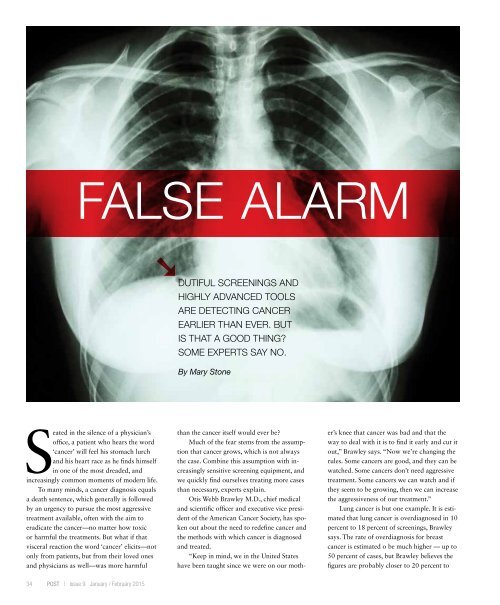You also want an ePaper? Increase the reach of your titles
YUMPU automatically turns print PDFs into web optimized ePapers that Google loves.
FALSE ALARM<br />
Dutiful screenings and<br />
highly advanced tools<br />
are detecting cancer<br />
earlier than ever. But<br />
is that a good thing?<br />
Some experts say no.<br />
By Mary Stone<br />
Seated in the silence of a physician’s<br />
office, a patient who hears the word<br />
‘cancer’ will feel his stomach lurch<br />
and his heart race as he finds himself<br />
in one of the most dreaded, and<br />
increasingly common moments of modern life.<br />
To many minds, a cancer diagnosis equals<br />
a death sentence, which generally is followed<br />
by an urgency to pursue the most aggressive<br />
treatment available, often with the aim to<br />
eradicate the cancer—no matter how toxic<br />
or harmful the treatments. But what if that<br />
visceral reaction the word ‘cancer’ elicits—not<br />
only from patients, but from their loved ones<br />
and physicians as well—was more harmful<br />
than the cancer itself would ever be?<br />
Much of the fear stems from the assumption<br />
that cancer grows, which is not always<br />
the case. Combine this assumption with increasingly<br />
sensitive screening equipment, and<br />
we quickly find ourselves treating more cases<br />
than necessary, experts explain.<br />
Otis Webb Brawley M.D., chief medical<br />
and scientific officer and executive vice president<br />
of the American Cancer Society, has spoken<br />
out about the need to redefine cancer and<br />
the methods with which cancer is diagnosed<br />
and treated.<br />
“Keep in mind, we in the United States<br />
have been taught since we were on our mother’s<br />
knee that cancer was bad and that the<br />
way to deal with it is to find it early and cut it<br />
out,” Brawley says. “Now we’re changing the<br />
rules. Some cancers are good, and they can be<br />
watched. Some cancers don’t need aggressive<br />
treatment. Some cancers we can watch and if<br />
they seem to be growing, then we can increase<br />
the aggressiveness of our treatment.”<br />
Lung cancer is but one example. It is estimated<br />
that lung cancer is overdiagnosed in 10<br />
percent to 18 percent of screenings, Brawley<br />
says. The rate of overdiagnosis for breast<br />
cancer is estimated o be much higher — up to<br />
50 percent of cases, but Brawley believes the<br />
figures are probably closer to 20 percent to<br />
34 <strong>POST</strong> | Issue 9 <strong>January</strong> / <strong>February</strong> <strong>2015</strong>


